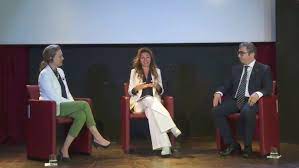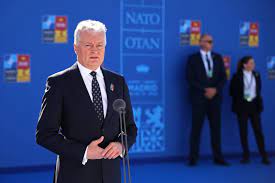Italy and US NATO Ambassadors discuss the Vilnius Summit

Rome: The Italian and American Permanent Representatives to the Atlantic Council discussed Ukraine and upcoming challenges in the Med and the Indo-Pacific at the event promoted by the NATO Public Diplomacy Division.
Road to Vilnius. The upcoming NATO Summit (to be held in the Lithuanian capital on July 11-12) will see allies focus on the immediate challenge – Russia’s aggression against Ukraine – as well as near-future threats. Two heavyweights – the Permanent Representatives to the Atlantic Council of Italy, Ambassador Marco Peronaci, and the United States, Ambassador Julianne Smith – delved into the matter on Tuesday at an event promoted by NATO’s Public Diplomacy Division and our sister website.
Here are some takeaways. On partnership and consolidation. Allies will reaffirm their unity and determination to support Kyiv in its struggle against Moscow, explained Ambassador Peronaci, and take strategic decisions to “strengthen medium- to long-term organisational arrangements” – while broadcasting the message that “NATO is stronger today than when the war started.”

Ambassador Smith then stressed the importance of international partnerships, noting that Allies will have a “360° approach” to Ukraine, the wider global stage, and future scenarios. NATO, she remarked, has the incredible ability to do all while evolving new partnerships and strengthening existing ones.
On Italy’s defence spending. Touching upon the NATO threshold for defence spending (2% of national GDP), Ambassador Peronaci stressed that Italy is confident about reaching it. He then pointed out the country’s other contributions to the Alliance, ranging from the battlegroups deployed in Latvia and Bulgaria to the assets made available for air patrolling.
On the Indo-Pacific. The area is the natural extension of the Alliance’s gaze, highlighted Ambassador Smith, noting that Allies agreed at the last Summit to label China as a “systemic challenge” for the first time – all while Beijing is “trying to erode” the system Allies created together 70 years ago.
Thus, NATO will have to strengthen its relations with the Indo-Pacific countries – Australia, New Zealand, South Korea and Japan first and foremost (their leaders will attend the Vilnius Summit).
This is not an expansion into Asia, she specified, but rather talking to partners in the region about common challenges.
Together, explained Ambassador Smith, Allies will strive to create a set of tools to ensure NATO can protect itself from the challenges that China might bring to the Euro-Atlantic area.
On the Med-MENA area. The Alliance’s does not omit the South, stressed Ambassador Peronato, including through partnership relations with countries and institutions – such as with the Istanbul Cooperation Initiative or the Mediterranean Dialogues. NATO, he said, must be capable of acting “before and after wars, with prevention and stabilisation”. Other actors occupy spaces that will be hard to recover in the absence of a strong presence of democratic countries, he warned.
Ambassador Smith then remarked that many friendly countries across the Mediterranean, in Africa and in the Middle East had expressed an interest in strengthening their ties with NATO.
This can take different forms, including assistance in security reforms, shared contributions, guaranteeing cybersecurity or countering Russian and Chinese disinformation campaigns.
On the Italy-US bond. The American ambassador finally remarked on the “very strong” bilateral relationship and long history of working together to address challenges between Rome and Washington in the Euro-Atlantic space and elsewhere in the world. She noted that global challenges will require even-greater collaboration on areas like climate change, migration, global health, and economic issues.
Ambassador Peronaci signed off by stressing the “bond that binds two communities beyond governments”. He said Italy can guarantee the US a presence in international bodies, such as the European Union, which are open to transatlantic cooperation.
That cooperation is also essential for common defence. “In Europe, we spend a lot, but we spend badly if we’re divided. We must do it better with the help of our US friends.”





